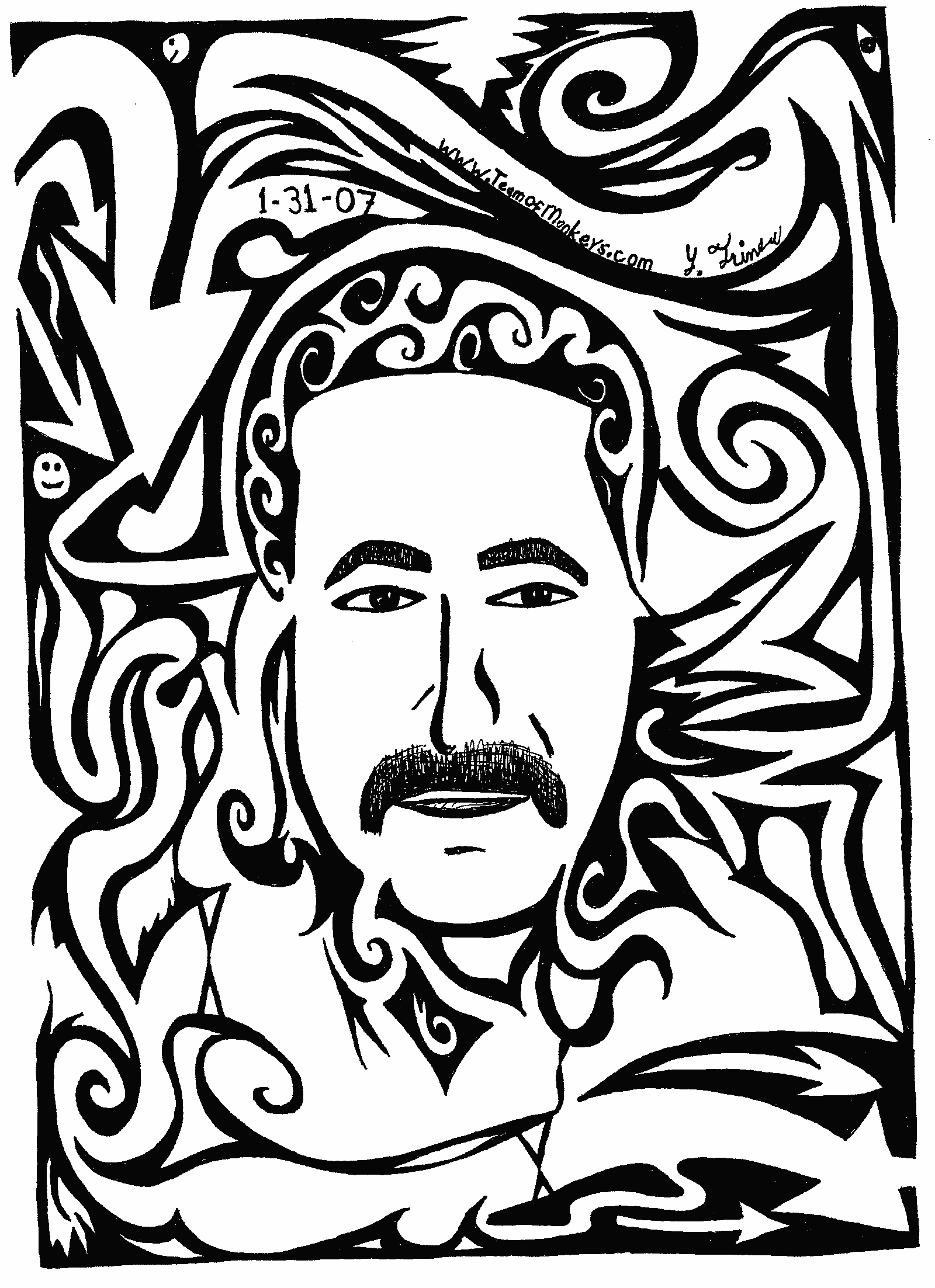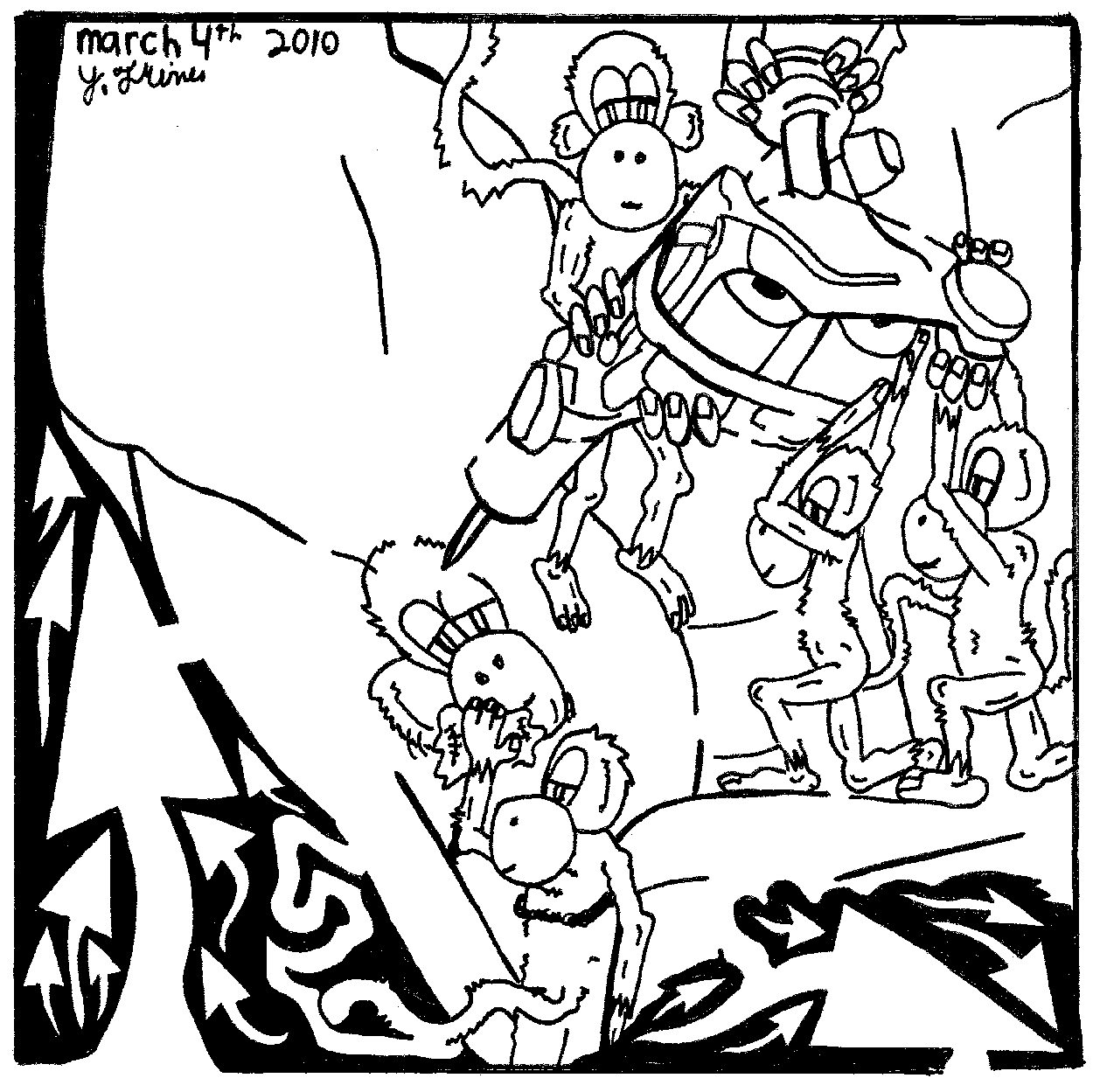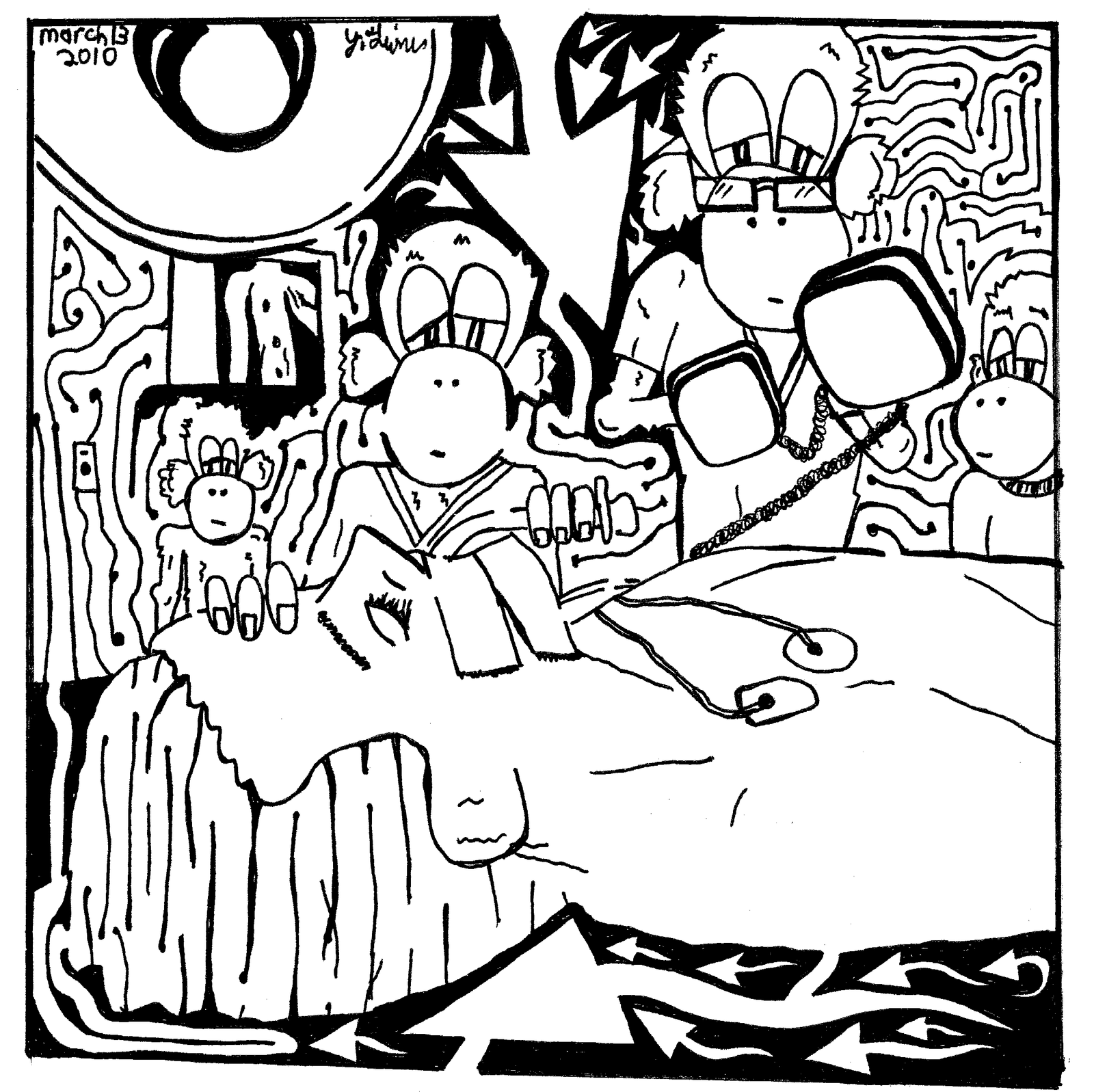 Team
Of
Monkeys.com
Team
Of
Monkeys.com 
Home Contact Info Image Archive 2006 Mazes About The Artist






<< BACK 1 2 3 4 5 6 7 8 9 10 11 12 13 More Mazes >>
 Team
Of
Monkeys.com
Team
Of
Monkeys.com 























 Team
Of
Monkeys.com
Team
Of
Monkeys.com 












There is something irresistible about an infant monkey - they appear so sweet and helpless, and seem so much like a human infant in many ways. However, those sweet babies grow up into difficult adults, and as a general rule adult monkeys do not make good pets. Their intelligence makes them special, but ultimately makes them a very challenging pet.
Commitment
Taking on a pet monkey is a long term commitment. A well cared for
monkey can live anywhere from 20-40 years, and needs your full
commitment throughout their lives. A pet monkey cannot do without your
attention when life gets busy or circumstances change.
Monkeys may not take well to new people in your life
(including spouses and children), and make it hard to get away for
vacations. Finding a new home for a pet monkey is extremely difficult,
and very hard on the monkey which has bonded to its first owner.
Legal Issues
Monkeys may
be
illegal
to keep as pets in some areas. Check locally
as well as state or province wide. If legal, permits may be required,
and sometimes permit holders are subject to inspection for proper
facilities and care.
Medical Issues
A wide range of diseases can be passed from monkeys to humans.
See
"Zoonoses Acquired from Pet Primates"
by David M. Renquist, D.V.M., M.A. and Robert A. Whitney, Jr., D.V.M.,
M.S. for a thorough discussion of this aspect. Finding a vet who is
able and willing to treat a primate may also be difficult. Monkeys are
also susceptible to a variety of illnesses of humans, which can be
devastating for the primate.
Aggression
The sweet dependent baby monkey will eventually grow up, and become
the wild animal it was meant to be. Unfortunately, raising a monkey
around humans doesn't change the wild nature of monkey, and in fact
depriving a pet monkey of normal social
relationships with other
monkeys can create behavior problems and neuroses.
Pet monkeys also have a tendency to bite. They have different
personalities so one cannot generalize, but some monkeys will be very
aggressive, and others will be more docile. Nevertheless, monkeys are
unpredictable and may turn aggressively on anyone, including the person
to whom they are the closest.
The Mess
Monkeys are messy. They can't really be effectively toilet trained
(many younger monkeys can be diapered or at least partly toilet
trained, but that is often lost at maturity) and sometimes engage in
distasteful activities involving their feces and urine.
Aside from the toileting messes, pet monkeys can be extremely
mischievous and destructive, especially if bored.
Housing
Monkeys need a large secure enclosure and should spend time
outdoors too if possible. They must be provided with a wide variety of
ever changing toys and exercise
equipment to keep them challenged and
stimulated, or they will suffer from boredom.
The Impossible Housing and Handling Conditions of
Monkeys in Research Laboratories
by Viktor Reinhardt, former research veterinarian
August 2001
Personally I see no ethical justification for any research which inflicts pain, distress, or suffering on animals, and primates in particular.
However, this type of research is a given reality and, as long as it continues, I feel a strong obligation to at least promote refinement techniques that lessen the suffering of animals whose lives are involuntarily sacrificed for a questionable research enterprise. When I do nothing I betray not only the animals but I also betray my humane nature.
When I saw a primate research facility from the inside for the first time, I quickly realized that the cruelty against monkeys is much more pervasive than I had concluded from the horrible pictures. The suffering is not restricted to the inhumane experimental procedure itself but extends to every single hour of the animal's life in the laboratory.
More than 700 macaques - the prevailing primates in the research laboratory - were locked behind bars, fearfully waiting to be forcefully removed and immobilized during life-threatening procedures.
The situation was reminiscent of a high security prison for convicted criminals, though none of the animals was guilty of any crime other than being a helpless victim.
Each monkey was kept alone, in a cage that was so small that he/she could not take a few steps in one direction, let alone jump or run in monkey fashion. There was no companion to huddle, groom or play with.
It should be remembered that macaques are primates - just like us - who have an intensive need for social contact and social interaction. Solitary living conditions are similarly unbearable for them as it would be for us.
Most cages were completely barren, offering not even a perch that would have allowed the animals to make use of the arboreal dimension. In the wild, macaques spend most of the day in elevated sites - away from ground predators - and seek the refuge of trees at night.
When kept in cages without a high perch, the animals have no way of retreating to a "safe" place during alarming events, such as when a staff member approaches them. Being cornered in this manner must, indeed, be a very distressing experience for a helpless monkey who associates people with painful and distressing handling procedures.
In order to accommodate as many monkeys in one room as possible, cages were arranged in double-tiers with one row stacked on top of the other. This condemned half of the animals to confinement in a permanently shady, cave-like environment. Needless to say, this was not a living quarter that was suitable for diurnal animals.
The conditions I witnessed were so depressing that most monkeys had developed stereotypic behaviors such as pacing, rocking, bouncing, somersaulting, swaying from side to side, biting parts of their own bodies, pulling their ears, tossing their heads back and forth, or smearing feces on the cage walls.
When I expressed my concern about these alarming signs of distress, I was told that they are "abnormal" behaviors that the animals develop when kept in cages for a long time. My conclusion was different: the appalling caging environment was abnormal - not the behavior of the monkeys.
It was hard for me to believe that the situation I had seen was typical. I therefore decided to contact animal care personnel of other laboratories and survey the scientific literature to find out how macaques are housed and handled in other research facilities.
What I heard and what I read confirmed what I had seen myself, leading me now to the following conclusion. In the U.S. there are currently approximately 15,000 macaques imprisoned in double-tier stacked solitary cages waiting in fear to be subjected to distressing procedures.
The conditions under which these animals are forced to live are so inadequate that researchers themselves have repeatedly admitted in scientific publications that about 10 out of 100 caged monkeys are so desperate that they mutilate themselves.
The recent scandal at the Oregon Regional Primate Research Center - one of the most prestigious facilities in this country - gives the public a rare opportunity to get a sobering look behind the doors and see for themselves that the manner in which most primates are currently being housed and handled is not only inhumane but at the same time counterproductive to good research.
Wouldn't it be naive to expect scientifically valid research data from an intelligent, social animal who is forced to live alone in a barren cage with nothing to do but engage in self-injurious behavior out of utter frustration?
Providing monkeys in research institutions with primate-adequate housing and humane handling conditions would be a guarantee that scientific data are not unnecessarily skewed by uncontrolled extraneous variables.
There is no doubt that primatological investigators could do their research with fewer animals - and hence avoid a lot of unnecessary suffering and squandering of tax dollars - if they would make sure that the animals are not behavioral cripples as a result of under-stimulation, and that they do not suffer distress during handling procedures.
The ethical and scientific concerns arising from the prevailing housing and handling practices of monkeys have been acknowledged by the United States Department of Agriculture in 1991 stipulating in the Regulations and Standards of the Animal Welfare Act that:
The housing arrangement of monkeys must [emphasis added by author] address the social needs of the animals, the cage environment must [emphasis added by author] be enriched by providing means of expressing monkey-typical behaviors, lighting must [emphasis added by author] be uniformly diffused and provide sufficient illumination for the well-being of the monkeys, handling should be done as carefully as possible in a manner that does not cause stress or unnecessary discomfort.
These legal requirements are consistent with guidelines promulgated by the International Primatological Society in 1989/1993 and recommendations set forth by the National Research Council in 1998.
Many reports have been published in scientific journals outlining well-tested options for addressing the social needs of monkeys in the research laboratory, for enriching their environment in a species-adequate manner, for assuring uniform lighting conditions, and for training the animals to cooperate, rather than resist, during common handling procedures such as capture, injection, topical drug application, and blood collection.
This information has also been compiled in bibliographies and a comprehensive database which can be accessed on the Internet at no cost.
How is it possible that investigators keep research monkeys under living conditions and handle them in ways that are in gross violation with federal rules and professional standards?
Here are my thoughts.
Lack of interest
A prestigious researcher conceded in an American scientific journal:
Most investigators think only briefly about the care and handling of their animals and clearly have not made it an important consideration in their work.
It is true, for many researchers the monkey is merely an identification number attached to a computer-processed data entry, and they consider it a waste of their time to visit the animals and check for themselves if they are properly housed and handled.
Arrogance
To quote from the same article:
Finally, I think that all investigators consider themselves upstanding citizens of excellent ethical and moral character. Their feeling may be that since they are moral and ethical in every sense of the word, they are quite capable of monitoring their own animals without outside interference.
Without question, most investigators regard compliance with the minimum housing standards set forth by the federal Animal Welfare Act as a nuisance.
Inertia of tradition
Many scientists resist any changes in the traditional husbandry practices of research monkeys, probably because of fear that historical data will be invalidated by different, albeit better, housing and handling conditions.
Lack of ethical concern
It is not uncommon for investigators to treat monkeys with little or even without ethical reservations. A world-famous scientist made this quite clear when he explained that experimentation with human patients is hampered by "sound ethical constraints", but that, "No such problems exist for the monkey researcher."
The present situation in primate research laboratories strongly suggests that professional judgment is no guarantee that the inhumane housing and handling conditions of laboratory monkeys will ever improve.
Progress will be possible only if USDA makes more serious efforts to enforce the federal law as Congress intended.
Until then, the well-being of research monkeys will continue to depend on the mercy of scientists who traditionally view them as research objects and treat them accordingly.
USDA Regulations and Standards give the public the impression that monkeys in research laboratories are housed and handled in ways that reflect minimum ethical concern for their well-being. The prevailing housing and handling conditions of monkeys give testimony that these federal rules are not enforced properly. If you care for the well-being of animals, and of caged primates in particular, you may want to contact:
Dr. Ron DeHaven
Acting Deputy Administrator
USDA, APHIS, AC
4700 River Road, Unit 97
Riverdale, MD 20737 USA
Please request that APHIS enforce more effectively the Animal Welfare Act's Specifications for the Humane Handling, Care and Treatment of Nonhuman Primates. Rules have no meaning unless provision is made that they are actually followed! Request that stronger regulations are needed to ensure the well-being of captive primates.
MEET THE AUTHOR
Viktor Reinhardt has worked for ten years as an ethologist and clinical veterinarian at a primate research facility where he took care of the animals' health and introduced more humane housing and handling conditions for them.
After the laboratory hired a new director, Dr. Reinhardt's work was no longer appreciated and his contract terminated in 1994.
He joined the Animal Welfare Institute, Washington DC, in the same year where he continues ‘from outside’ to promote better living conditions for nonhuman primates in research institutions.
The Animal Welfare Institute has recently published Environmental Enrichment for Caged Rhesus Macaques - A Photographic Documentation and Literature Review.
You can order a free copy of this book by sending an e-mail to awi@awionline.org or by phoning 202-337-2332.
Bibliographies
http://www.nal.usda.gov/awic/pubs/primates/primate.htm
http://www.awionline.org/lab_animals/biblio/index.html
Database
http://www.awionline.org/Lab_animals/biblio/enrich.htm



 Team
Of
Monkeys.com
Team
Of
Monkeys.com 